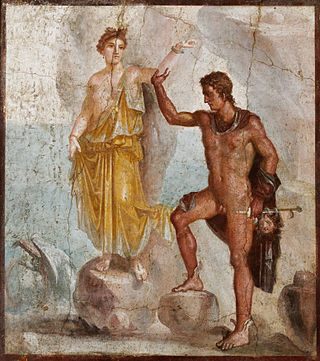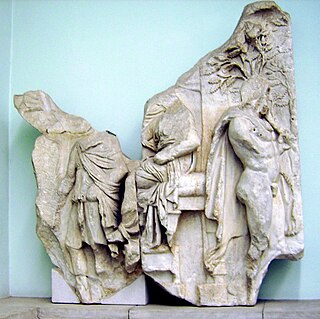
In Greek mythology, Phineus (/ˈfɪniəs, ˈfɪn.juːs/; Ancient Greek: Φινεύς, Ancient: [pʰiːněws] ) was a son of Belus by Anchinoe and thus brother to Aegyptus, Danaus and Cepheus. [1]

In Greek mythology, Phineus (/ˈfɪniəs, ˈfɪn.juːs/; Ancient Greek: Φινεύς, Ancient: [pʰiːněws] ) was a son of Belus by Anchinoe and thus brother to Aegyptus, Danaus and Cepheus. [1]
Phineus had been engaged to Cepheus' daughter Andromeda before she wed Perseus, and Phineus plotted against him, leading Perseus to turn him and his co-conspirators into stone by showing them the head of Medusa. [2] The affair appears to have formed part of Euripides' lost Andromeda , [3] and receives a single line in Apollodorus' Bibliotheca, [2] but the only extensive ancient treatment is found in Ovid's Metamorphoses . [4]
In Ovid's account Perseus asked for Andromeda's hand in return for saving the girl from the sea-monster Cetus, to whom an oracle had ordained Andromeda be sacrificed as punishment for her mother Cassiopeia's boast that she was more beautiful than the Nereids. [5] Perseus was successful, but as he recounted his deeds to the court, a spear-brandishing Phineus interrupted him:
"en" ait, 'en adsum praereptae coniugis ultor; | "See," he shouted, "See, I come here as an avenger for the carrying off of my bride. |
Phineus' presumed motive in marrying Andromeda was to strengthen his claim to the throne, rather than any interest in the girl herself. Cepheus scolded his brother for this outburst, pointing out that he had done nothing to help Andromeda in the crisis, but Phineus still cast his spear at Perseus. Although he missed, a fierce battle ensued in which many fell, until Perseus held up the head of the Gorgon, turning all his remaining enemies (except for Phineus) to stone. Amazed by this, Phineus pleaded for his life with his gaze averted, but Perseus approached him and held the head before his eyes, turning Phineus also to stone. [7]

In Greek mythology, Andromeda is the daughter of Cepheus, the king of Aethiopia, and his wife, Cassiopeia. When Cassiopeia boasts that she is more beautiful than the Nereids, Poseidon sends the sea monster Cetus to ravage the coast of Aethiopia as divine punishment. Queen Cassiopeia understands that chaining Andromeda to a rock as a human sacrifice is what will appease Poseidon. Perseus finds her as he is coming back from his quest to decapitate Medusa, and brings her back to Greece to marry her and let her reign as his queen. With the head of Medusa, Perseus petrifies Cetus to stop it from terrorizing the coast any longer.

In Greek mythology, Cerberus, often referred to as the hound of Hades, is a multi-headed dog that guards the gates of the Underworld to prevent the dead from leaving. He was the offspring of the monsters Echidna and Typhon, and was usually described as having three heads, a serpent for a tail, and snakes protruding from his body. Cerberus is primarily known for his capture by Heracles, the last of Heracles' twelve labours.
In Greek mythology, Aegyptus or Ægyptus was a legendary king of ancient Egypt. He was a descendant of the princess Io through his father Belus, and of the river-god Nilus as both the father of Achiroe, his mother and as a great, great-grandfather on his father's side.

In Greek mythology, Phineus or Phineas, was a king of Salmydessus in Thrace and seer, who appears in accounts of the Argonauts' voyage. Some accounts make him a king in Paphlagonia or in Arcadia.
Agenor was in Greek mythology and history a Phoenician king of Tyre or Sidon. The Greek historian Herodotus, born in the city of Halicarnassus under the Achaemenid Empire, estimated that Agenor lived either 1000 or 1600 years prior to his visit to Tyre in 450 BC at the end of the Greco-Persian Wars. He was said to have reigned in that city for 63 years.

In Greek mythology, Telephus was the son of Heracles and Auge, who was the daughter of king Aleus of Tegea. He was adopted by Teuthras, the king of Mysia, in Asia Minor, whom he succeeded as king. Telephus was wounded by Achilles when the Achaeans came to his kingdom on their way to sack Troy and bring Helen back to Sparta, and later healed by Achilles. He was the father of Eurypylus, who fought alongside the Trojans against the Greeks in the Trojan War. Telephus' story was popular in ancient Greek and Roman iconography and tragedy. Telephus' name and mythology were possibly derived from the Hittite god Telepinu.
Eurytus, Eurytos or Erytus (Ἔρυτος) is the name of several characters in Greek mythology, and of at least one historical figure.
In Greek mythology, Epaphus, also called Apis or Munantius, was a son of the Greek God Zeus and king of Egypt.
Dictys was a name attributed to four men in Greek mythology.

In Greek mythology, Hippomenes, also known as Melanion, was a son of the Arcadian Amphidamas or of King Megareus of Onchestus and the husband of Atalanta. He was known to have been one of the disciples of Chiron, and to have surpassed other disciples in his eagerness to undertake hard challenges. Inscriptions mention him as one of the Calydonian hunters.
In Greek mythology, Belus was a king of Egypt and father of Aegyptus and Danaus and (usually) brother to Agenor. The wife of Belus has been named as Achiroe or Side.
Actor is a very common name in Greek mythology. Here is a selection of characters that share this name :

In Greek mythology, Cepheus was the name of two rulers of Aethiopia, grandfather and grandson.

In Greek mythology, Phoenix or Phoinix was the eponym of Phoenicia who together with his brothers were tasked to find their abducted sister Europa.

In Greek mythology, Aleus was the king of Arcadia, eponym of Alea, and founder of the cult of Athena Alea. He was the grandson of Arcas. His daughter Auge was the mother of the hero Telephus, by Heracles. Aleus' sons Amphidamas and Cepheus, and his grandson Ancaeus were Argonauts. Ancaeus was killed by the Calydonian boar.
Achiroë, Anchirrhoë (Ἀγχιρρόη), or Anchinoë (Ἀγχινόη), which is perhaps a mistake for Anchiroë, was in Greek mythology an Egyptian naiad, as daughter of the river-god Nilus. She was the wife of King Belus of Egypt, by whom she became the mother of Aegyptus and Danaus, and, according to some accounts, Cepheus, and Phineus.

Andromeda is a lost tragedy written by Euripides, based on the myth of Andromeda and first produced in 412 BC, in a trilogy that also included Euripides' Helen. Andromeda may have been the first depiction on stage of a young man falling in love with a woman. The play has been lost; however, a number of fragments are extant. In addition, a number of ancient sources refer to the play, including several references in plays by Aristophanes.
In Greek mythology, Aeolus or Aiolos was the son of Hellen, the ruler of Aeolia, and the eponym of the Aeolians, one of the four main tribes of the Greeks. According to the mythographer Apollodorus, Aeolus was the father of seven sons: Cretheus, Sisyphus, Athamas, Salmoneus, Deion, Magnes, Perieres, and five daughters: Canace, Alcyone, Pisidice, Calyce, and Perimede. He was said to have killed his daughter Canace because she had committed incest with her brother Macareus. This Aeolus was sometimes confused with the Aeolus who was the ruler of the winds.

In Greek mythology, Aeolus, the son of Hippotes, was the ruler of the winds encountered by Odysseus in Homer's Odyssey. Aeolus was the king of the island of Aeolia, where he lived with his wife and six sons and six daughters. To ensure safe passage home for Odysseus and his men, Aeolus gave Odysseus a bag containing all the winds, except the gentle west wind. But when almost home, Odysseus' men, thinking the bag contained treasure, opened it and they were all driven by the winds back to Aeolia. Believing that Odysseus must evidently be hated by the gods, Aeolus sent him away without further help. This Aeolus was also sometimes confused with the Aeolus who was the son of Hellen and the eponym of one of the four major Ancient Greek tribes, the Aeolians.
In Greek mythology, Aconteus may refer to the following distinct two individuals:
{{citation}}: CS1 maint: location missing publisher (link).{{citation}}: CS1 maint: location missing publisher (link).